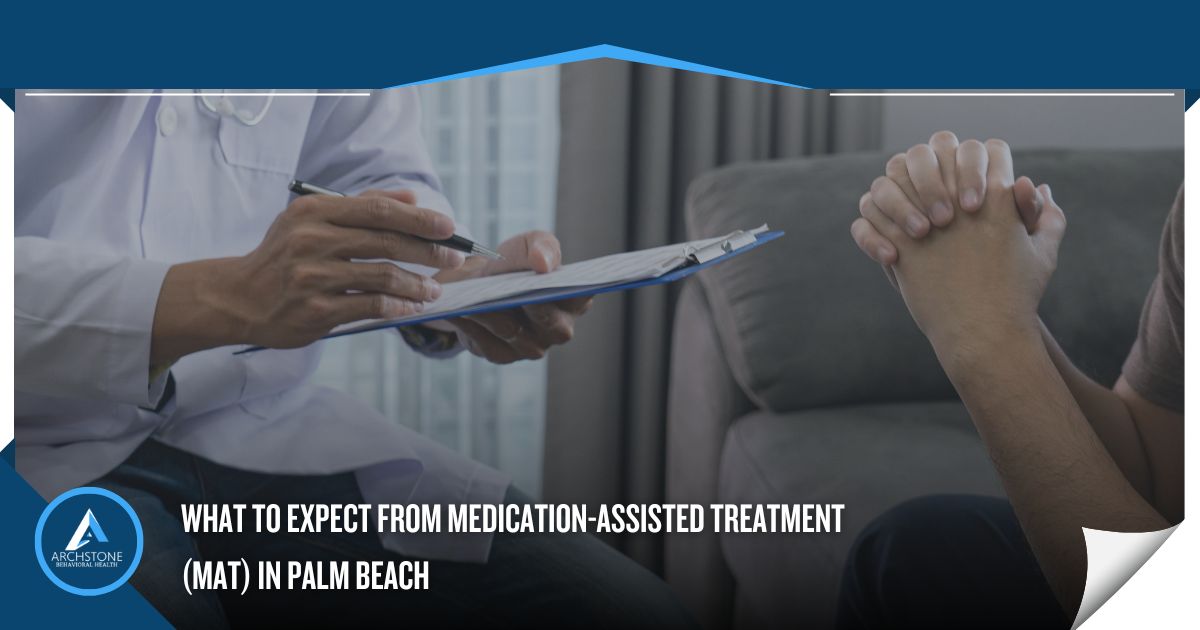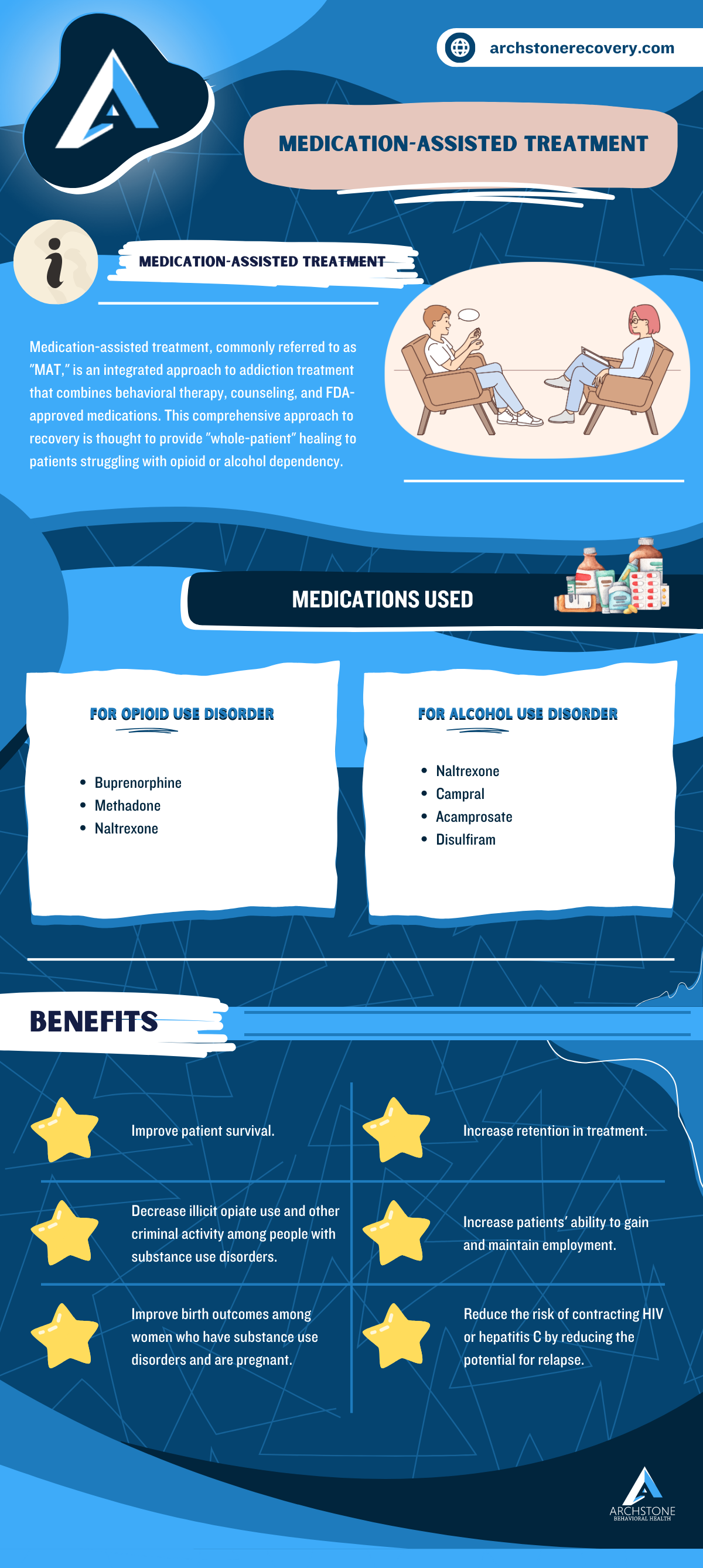What to Expect From Medication-Assisted Treatment (MAT) in Palm Beach
Get Help Now

Because addiction is a complex and chronic condition, it requires extensive treatment to recover. While traditional substance abuse treatment methods can work, there is a better option for those at risk of relapsing. Medication-assisted treatment (MAT) programs in Palm Beach offer FDA-approved medications to limit withdrawal symptoms and prevent cravings during early recovery, reducing your chances of relapsing.
MAT programs combine these medications with in-depth assessments, evidence-based behavioral therapies, and aftercare services. The medications help patients focus on recovering emotionally and behaviorally, ensuring that they develop the skills they need to be successful in sobriety.
Why Choose Medication-Assisted Treatment (MAT) in Palm Beach?
Medication-assisted treatment (MAT) programs are ideal for people struggling with either opioid use disorder or alcoholism. In combination with traditional addiction treatment methods, MAT programs use medications that target opioid receptors in the brain to prevent withdrawal symptoms and cravings.
If you are wondering why you should choose a MAT program in Palm Beach, SAMHSA reports that these programs provide the following benefits:[2]
- Improved patient survival
- Increased retention in treatment
- Decreases illicit opiate use and other criminal activity among people with substance use disorders
- Increases patients’ ability to gain and maintain employment
- Improved birth outcomes among women who have substance use disorders and are pregnant
By using medications to prevent withdrawal symptoms and cravings, MAT programs lessen your chances of relapsing. And, since you’re not distracted by cravings, you also get more out of your individual therapy and group counseling. Additionally, research has found that employment rates are higher for those who participated in MAT.
What to Expect From Medication-Assisted Treatment in Palm Beach
Medication-assisted treatments take the physical strain out of addiction recovery by offering medications to lessen withdrawal and cravings. However, MAT programs in Palm Beach do more than simply prescribe medications. During your time at one of these facilities, you will undergo a wide range of services including intake, in-depth assessments, medically assisted detox, individual and group counseling, medication management, and aftercare services.
During MAT in Palm Beach, you can expect the following:
Intake and Assessment
The first step in medication-assisted treatment is intake. When you arrive at the facility, you will sign release forms and give the medical staff important information related to your treatment, such as insurance details or emergency contacts.
In addition, intake includes an in-depth assessment that gathers information about your physical and mental health as well as your substance abuse history. This will be used to create an individualized treatment plan based on your specific needs.
Medically-Assisted Detox
After intake, you will begin detox. MAT in Palm Beach uses a medically-assisted approach to detox, which means you will be given medications that limit your withdrawal symptoms while keeping you safe and comfortable.
The type of medication you are given will depend on the substance you are addicted to, how severe your dependency is, and what withdrawal symptoms you are dealing with. For example, someone struggling with opioid addiction might be given methadone, Suboxone, clonidine, or Lucemyra depending on their needs.
Behavioral Therapies
After you’ve overcome your withdrawals, it’s time to begin working on the emotional and behavioral aspects of recovery. You will participate in both individual therapy and group counseling to develop the coping skills you need to maintain sobriety and address the root causes of your addiction. Some common therapeutic approaches include:
- Cognitive-behavioral therapy (CBT)
- Motivational Interviewing (MI)
- Contingency Management
- Dialectical Behavior Therapy (DBT)
- 12-Step Facilitation Therapy
- Family Therapy
- Group Therapy
- Individual Counseling
Medication Management
You might continue to take medications throughout your recovery journey to ensure that your cravings do not hinder your progress.
For example, if you have an opioid use disorder you might stay on Suboxone or Vivitrol if your doctor believes it’s necessary. On the other hand, people recovering from alcoholism might take disulfiram or naltrexone, which can eliminate cravings and prevent relapse by causing adverse reactions when alcohol is consumed.
The length of time you take these medications will depend solely on your progress in treatment. Once you are ready to tackle sobriety without them, you will be slowly tapered off to ensure you do not experience adverse side effects.
Aftercare Services
Recovery continues after you complete your treatment program. As a result, MAT programs in Palm Beach offer extensive aftercare services to keep you connected to a community and offer support while you transition into everyday life.
Aftercare services may involve continued medication management, outpatient therapy sessions, and alumni support groups to ensure you have a community to rely on.
Get Connected to a Top-Rated MAT Program in Palm Beach
If you or a loved one struggles with opioid or alcohol addiction, MAT in Palm Beach might be right for you. At Archstone Behavioral Health, we understand how difficult it can be to overcome withdrawal and deal with cravings during early recovery. This is why we offer medication-assisted treatment services to our clients who need it.
To learn more about MAT in Palm Beach, contact us today.
References:
- The Substance Abuse and Mental Health Services Administration (SAMHSA): HHS, SAMHSA Release 2022 National Survey on Drug Use and Health Data, Retrieved January 2024 From https://www.samhsa.gov/newsroom/press-announcements/20231113/hhs-samhsa-release-2022-nsduh-data
- The Substance Abuse and Mental Health Services Administration (SAMHSA): Medications for Substance Use Disorders, Retrieved January 2024 From https://www.samhsa.gov/medications-substance-use-disorders
